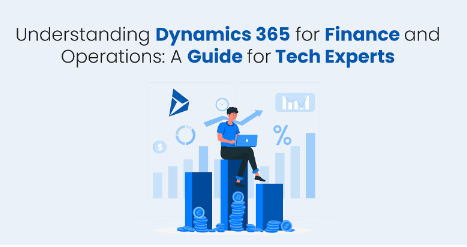In business software, Microsoft Dynamics 365 for Finance and Operations (D365 FinOps) is a robust and complete tool that helps businesses manage their money, stock, stores, and staff better. It’s perfect for companies looking to make their work smoother, report finances more accurately, and make smarter decisions. This blog post is about taking a closer look at D365 FinOps, from how it’s built, what it can do, how it works with other systems, and some tips on how to set it up and make it your own. Whether you work in IT, develop software, or manage systems, this post will help you understand the details of D365 FinOps and how it can help businesses grow and work more efficiently.
Architecture Overview
Dynamics 365 Finance Operations is built on a modern, scalable, and flexible architecture designed to support the needs of large, global enterprises. At its core, D365 FinOps utilizes Azure’s cloud infrastructure, ensuring high availability, security, and compliance with industry standards. The architecture is comprised of several key components:
Application Object Server (AOS)
The backbone of D365 FinOps, responsible for executing business logic, handling transactions, and ensuring database integrity.
Database Tier
Utilizes Azure SQL Database or SQL Server, depending on the deployment model, to store and manage data.
Client Tier
Offers multiple access points through web-based, mobile, and desktop clients, ensuring users can interact with the system from anywhere.
Retail Server
Serves as a bridge between retail components and the AOS, facilitating omnichannel retail operations.
The system also supports a microservices architecture for specific functionalities, such as tax calculation and address verification, allowing for scalability and flexibility in handling complex processes.
Key Features and Functionalities
D365 FinOps has features designed to support a wide range of business processes. Some of the notable functionalities include:
Financial Management
Comprehensive tools for accounting, budgeting, project management, and financial reporting.
Supply Chain Management
Advanced capabilities for inventory management, procurement, and logistics, including AI-driven insights for optimization.
Retail and Commerce
Integrated solutions for brick-and-mortar stores, online sales, and omnichannel strategies.
Human Resources
Tools for employee management, payroll, and performance tracking.
Project Management
Features for project planning, resource allocation, and billing.
Integration Capabilities
One of the strengths of D365 FinOps is its ability to integrate seamlessly with other systems and applications, both within the Dynamics 365 suite and external systems. This is facilitated through:
Data Entities
Predefined entities that allow for the easy exchange of data between D365 FinOps and other systems.
Common Data Service (CDS)
Enables integration with other Dynamics 365 applications and Microsoft Power Platform.
Custom Services
Developers can create custom services using X++ or .NET for specific integration needs.
Logic Apps and Flow
Facilitate automation and integration with third-party applications through pre-built connectors.
Deployment and Customization
D365 FinOps offers flexibility in deployment, with options for cloud, on-premises, or hybrid models. The choice of deployment affects aspects such as accessibility, maintenance, and compliance. Regardless of the deployment model, customization and extensibility are critical for adapting the system to specific business requirements. Best practices include:
Extension-based Customization
Instead of directly modifying the system, use extensions to add functionality, ensuring easier upgrades and maintenance.
Lifecycle Services (LCS)
Utilize LCS for project management, environment management, and application lifecycle management.
DevOps Practices
Implement continuous integration and delivery (CI/CD) pipelines for managing code changes and deployments.
Challenges and Considerations
While D365 FinOps offers numerous benefits, organizations may face challenges during implementation, such as:
Complexity
The comprehensive nature of D365 FinOps means that implementation can be complex and resource-intensive.
Change Management
Ensuring user adoption and managing the change process is critical for successful implementation.
Customization vs. Standardization
Balancing the need for customization with the benefits of standardization is crucial for maintaining system integrity and upgradeability.
Conclusion
Microsoft Dynamics 365 Finance Operations is a powerful ERP solution that can transform the way organizations manage their financial and operational processes. Its robust architecture, comprehensive feature set, and integration capabilities make it an ideal choice for businesses looking to enhance efficiency, improve decision-making, and drive growth. However, success with D365 FinOps requires careful planning, skilled implementation, and ongoing management to fully realize its potential. By understanding its technical aspects, organizations can better navigate the challenges and leverage the system to achieve their strategic objectives.



